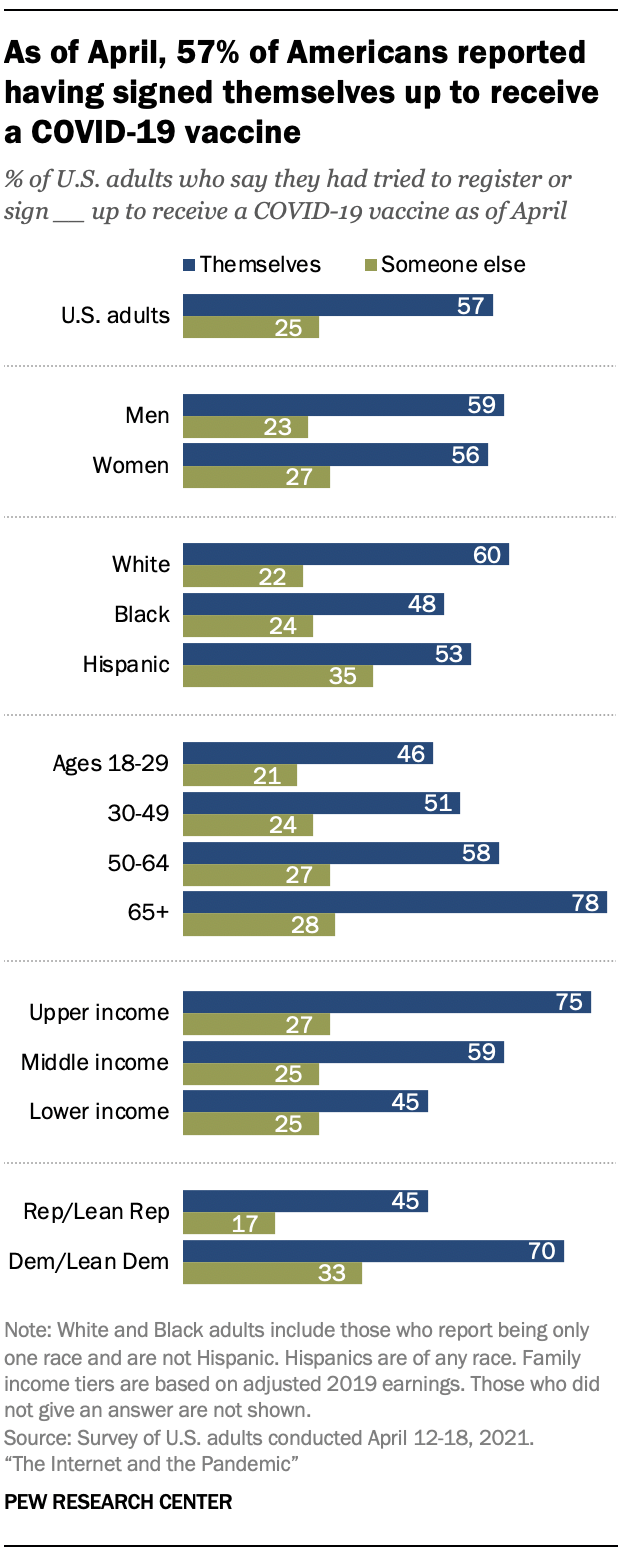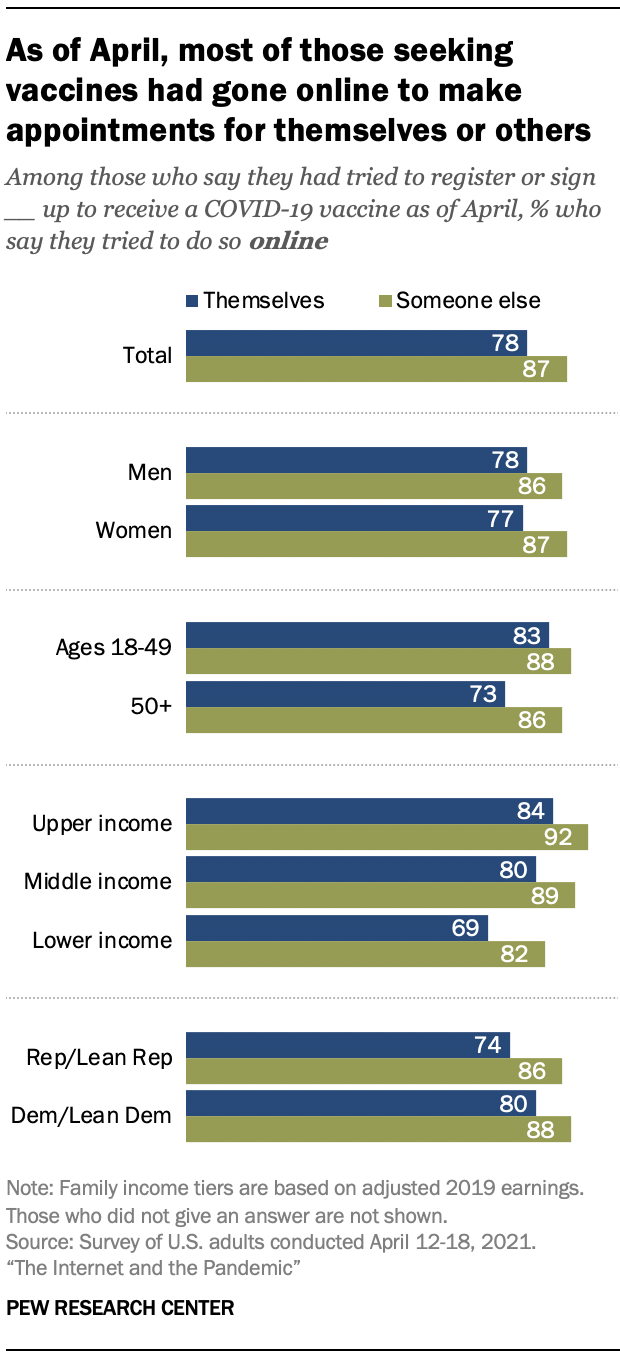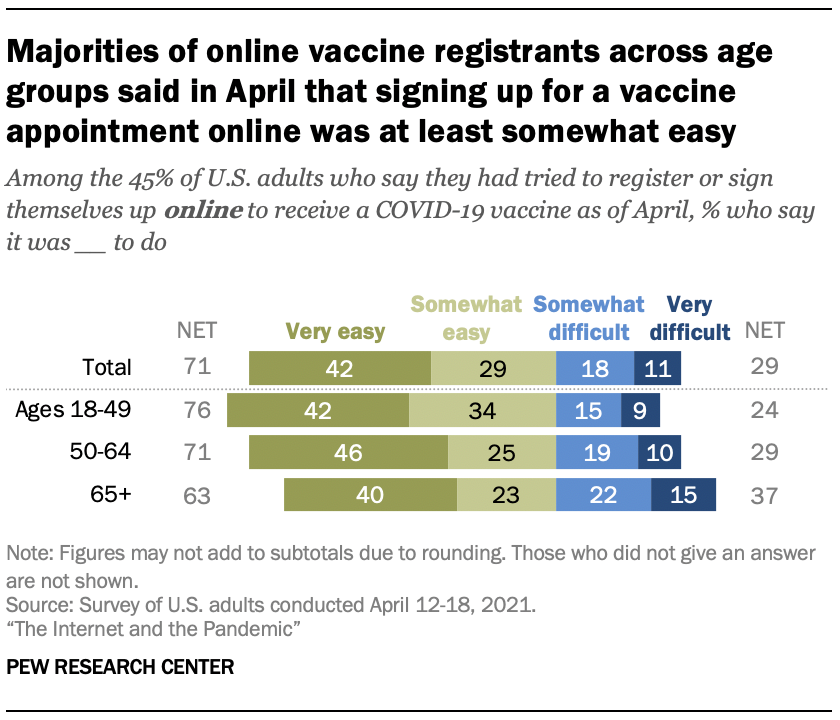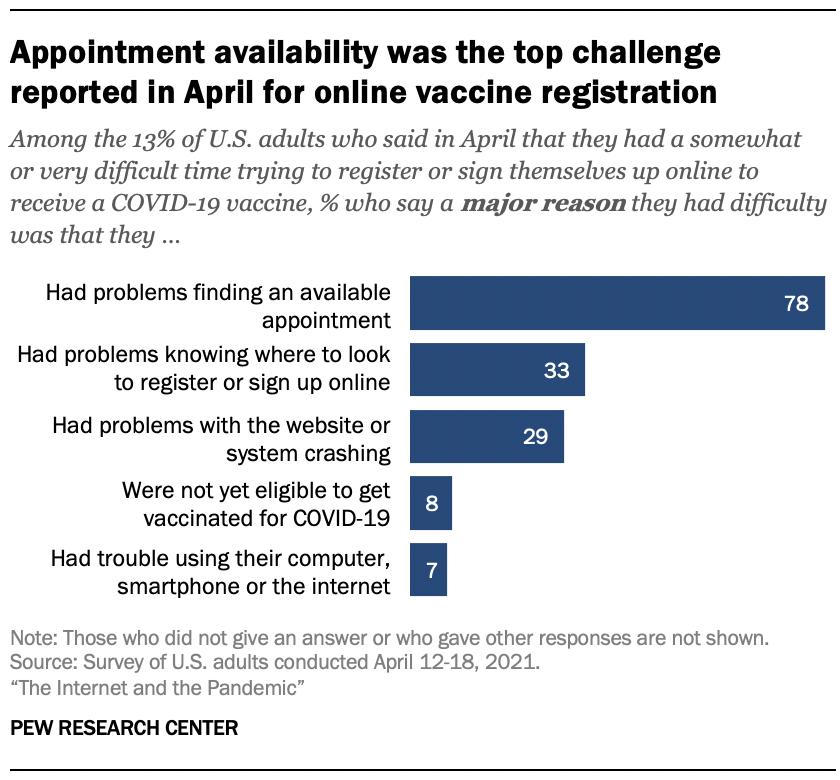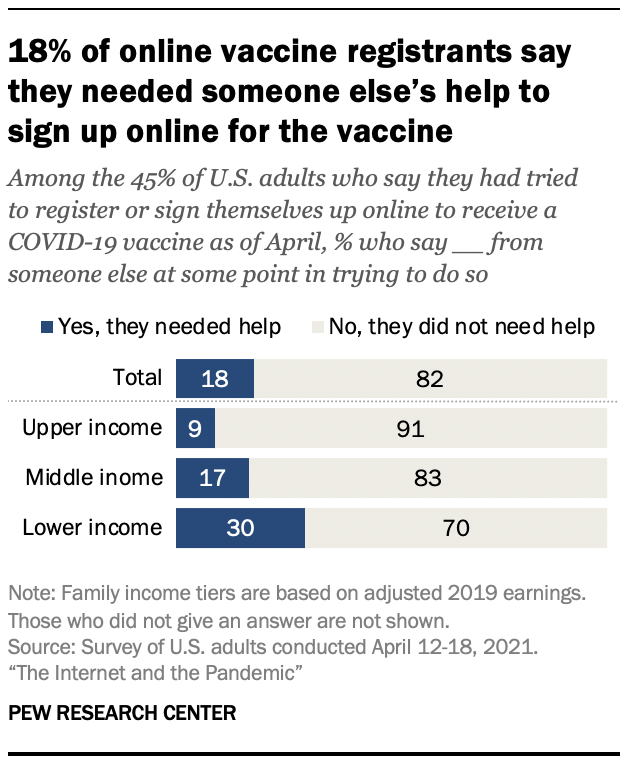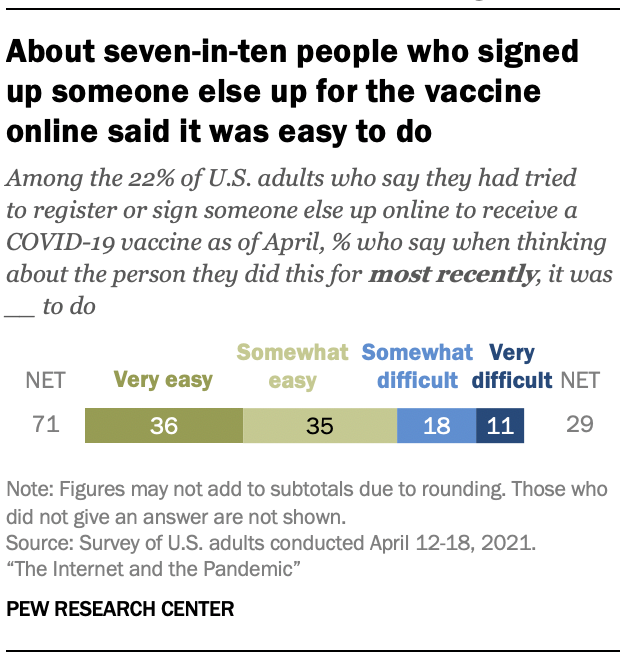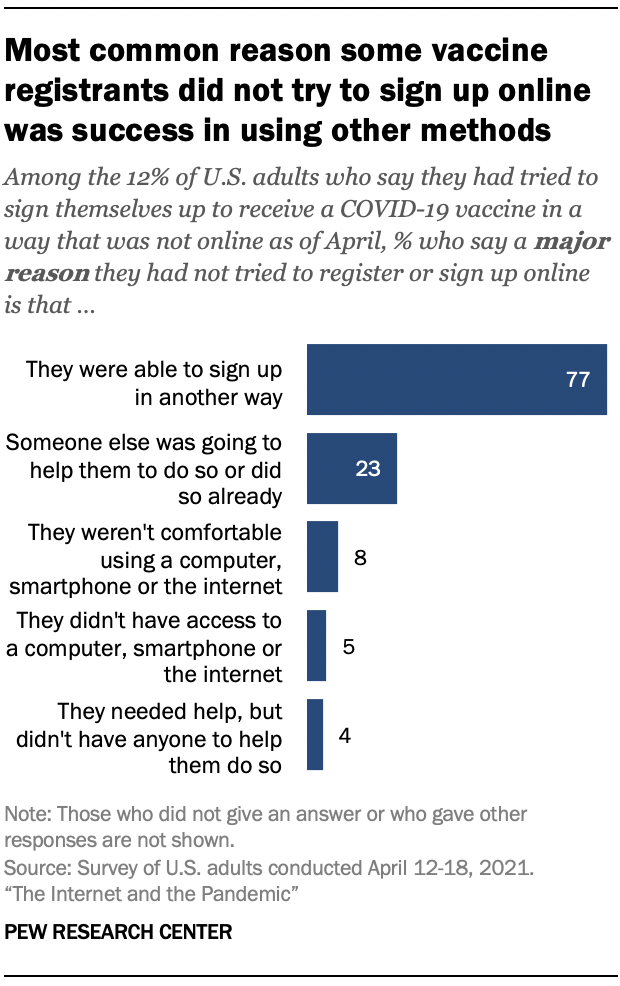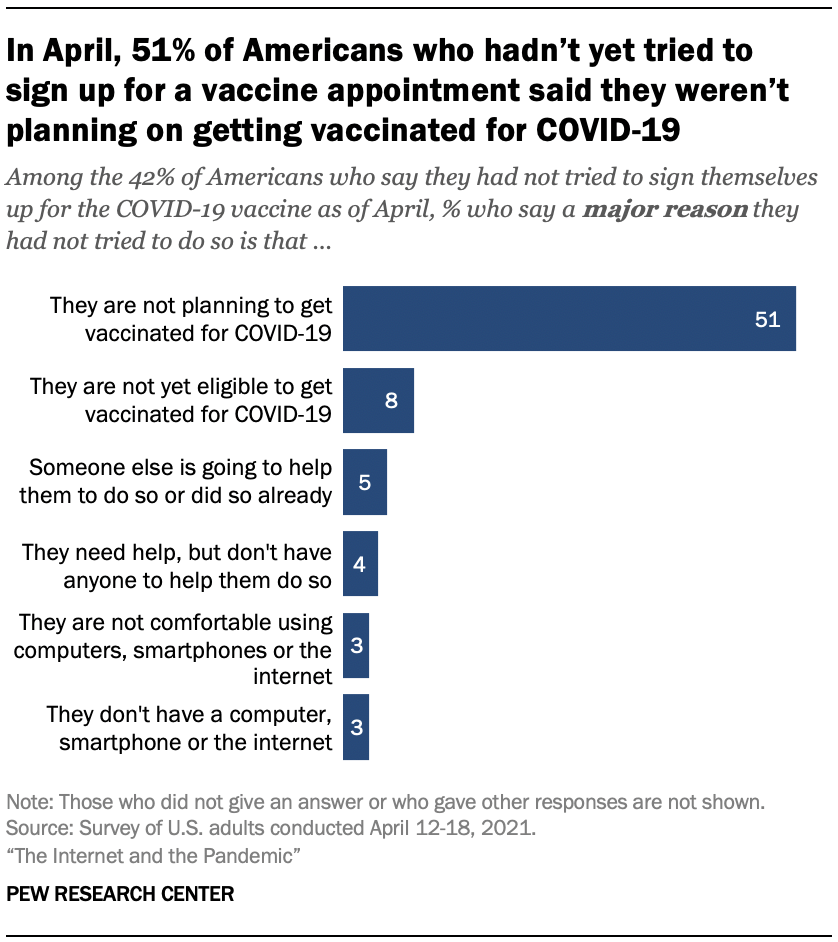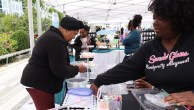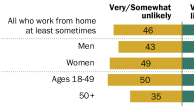In the early months of 2021, COVID-19 vaccines began to roll out and the public was thrust into a vaccine registration system that was sometimes characterized in the media as confusing and competitive.
Vaccination registration terminology
Several terms are used in this chapter to describe people based on whether or not they had tried to sign themselves up for a COVID-19 vaccination appointment as of April:
Vaccine registrant refers to a person who had tried to sign themself up for a vaccine appointment. Some 57% of U.S. adults said they had done so in the April survey.
- Online vaccine registrant is used to describe a person who tried to sign themself up for a vaccine appointment online. Some 45% of U.S. adults said they had done so as of the time this survey was fielded in April 2021.
- Offline vaccine registrant is used to refer to a person who tried to sign themself up for a vaccine appointment in a way that was not online. Some 12% of U.S. adults said they had done so as of the time this survey was fielded in April 2021.
Vaccine non-registrant refers to a person who did not try to sign themself up for the COVID-19 vaccine as of April. Some 42% of U.S. adults said they had not done so as of the time this survey was fielded in April 2021.
In order to better understand people’s experiences during this time, the survey fielded in mid-April asked about Americans’ attempts to obtain a vaccine appointment for themselves and others – including the challenges they may have faced along the way. It is important to note that the situation surrounding vaccine registration is evolving and changing continually. This chapter is merely a snapshot of the landscape of vaccine registration as of when the survey was fielded in mid-April 2021. Registration rates and challenges have changed since April due to these ever-changing circumstances.
The survey shows that by April 2021 many of those who wanted to get vaccinated were finding it at least somewhat easy to get an appointment online. And when asked about five potential reasons they had difficulty, relatively few of those who were experiencing challenges at that time said that technology- or system-related struggles were major reasons for this difficulty. Instead, people said their problems with vaccine registration primarily arose from a lack of available appointments in their area at the time they were trying to sign up.
The survey found that by mid-April roughly six-in-ten American adults (57%) had tried to register or sign themselves up for the vaccine, and a quarter had done so for someone else.11
About eight-in-ten adults ages 65 and older said they had already signed themselves up for the vaccine, compared with 58% of those ages 50 to 64 and somewhat smaller shares of adults under the age of 50. This pattern largely parallels the age restrictions that were a part of the vaccine rollout and which prioritized vaccinating older Americans before other age groups. Adults 65 and older were also slightly more likely to have signed up someone else for the vaccine than adults 18 to 29 (28% vs. 21%). Those 30 to 64 did not significantly differ from either of their oldest and youngest counterparts in having signed up others for the vaccine.
Adults with higher incomes were also more likely to say they had registered themselves for the vaccine than their less affluent counterparts in April 2021.
White adults were more likely to say they had signed themselves up for the vaccine than Black adults. At the same time, Hispanic adults were more likely than their White or Black counterparts to have signed someone else up for the vaccine. Some 35% of Hispanic adults said they had signed someone else up by mid-April, while about a quarter Black or White Americans said the same.
Like other COVID-19 issues, the vaccine rollout had become highly politicized by last spring. This was also the case when it came to the vaccine signup process. Seven-in-ten Democrats said they had signed themselves up for the vaccine by April 2021, while 45% of Republicans said they had signed up. Similarly, Democrats were more likely than Republicans to have signed someone else up to vaccinated.
Vaccine appointments were predominantly scheduled online
Among those who had signed themselves or others up for the vaccine by mid-April, about eight-in-ten or more said they tried to do so online. In total, 45% of American adults had signed themselves up online, while 22% had done so for someone else.
While majorities across demographic groups who tried to sign themselves or others up turned to the internet to make vaccine appointments, there were some differences across groups.
The share of adult vaccine registrants under 50 who said they tried to sign themselves up online was 10 percentage points higher than for registrants 50 and older. In addition, a modest difference in using the internet for vaccine registration was seen between Democrats and Republicans who signed themselves up for the vaccine. Eight-in-ten Democratic vaccine registrants say they used online systems, compared with roughly three-quarters of their Republican counterparts.
While about seven-in-ten vaccine registrants with lower household incomes said in April that they had tried to sign up online, eight-in-ten or more middle- and upper-income registrants said they tried to do this.
Some 62% of Black vaccine registrants had tried to sign themselves up online, while about three-quarters or more of White or Hispanic registrants had tried to do this (79% and 76%, respectively).
Few demographic differences are present for having signed someone else up online. People with lower incomes who tried to sign someone else up for the vaccine were 10 points less likely than those with higher incomes who tried to sign someone else up to have done so online.
About three-in-ten online vaccine registrants report they experienced difficulty signing up
Online systems for vaccine registration stirred media coverage as problems arose. The Center explored the issues online vaccine registrants faced by asking the 45% of Americans who had tried to register themselves online for vaccination about their experiences.
In mid-April, 29% of those who had tried to sign themselves up for the vaccine online said signing up online was at least somewhat difficult, while 71% said doing so had been at least somewhat easy. In all, that comes to 13% of Americans who said they had experienced difficulty signing up for vaccines online as of mid-April.
Beyond that, as the vaccine rollout began, concerns were raised in the media regarding seniors’ capability to sign up for the vaccine online – be it due to a lack of internet access or digital literacy. The survey shows that 37% of online vaccine registrants 65 and older reported experiencing at least some difficulty, making them more likely than their younger counterparts to report experiencing difficulties. Still, a majority of online vaccine registrants 65 and older said signing up was at least somewhat easy to do.
Tech readiness is also related to how difficult people found trying to sign themselves up online to be. Online vaccine registrants who struggle either with using new devices independently or who do not feel confident using devices effectively – that is, they have lower tech readiness, as described in Chapter 3 – are more likely to report experiencing difficulty (37%) than those who have higher tech readiness (25%). Still majorities in both groups reported signing up online with at least some ease (63% and 75%, respectively).
When asked about five potential reasons for why signing up for the vaccine online had been difficult, about eight-in-ten online vaccine registrants who reported difficulties said a major reason why they had difficulty was that they had problems finding an available appointment. This share was more than twice as large as the second most common reason cited.
Roughly three-in-ten of those who tried to sign themselves up for the COVID-19 vaccine online and said it was at least somewhat difficult to do said their lack of knowledge about where to sign up online (33%) and problems with the online system crashing (29%) were major reasons why they faced difficulties. Smaller shares said not yet being eligible to receive the vaccine or difficulty using technology were major reasons.
Many of these challenges are less likely to be issues now for those seeking to get vaccinated. While the demand for vaccine appointments outpaced the supply of vaccines in the early months of 2021, many vaccination sites have started predominantly doing walk-in appointments for anyone interested in a vaccine, while other vaccination sites have closed due to lack of demand. And as of the time of writing, Americans ages 12 and older are eligible to receive the vaccines if they so choose. In addition, new challenges may arise as Americans seek booster shots under new recommendations from the Centers for Disease Control and Prevention.
As of mid-April, about a fifth of Americans who had tried to sign themselves up for the COVID-19 vaccine online reported they needed help from someone else at some point in doing so. That amounts to 8% of all adults.
There were some differences by household income: 30% of online vaccine registrants with lower incomes said they needed such help, compared with 17% of those with middle incomes and 9% of those in the upper income category. By contrast, there were no statistical differences in needing help between adult online registrants under 50 years old (17%), those ages 50 to 64 (16%) and those 65 and older (21%).
Online vaccine registrants who said it was at least somewhat difficult to register for the vaccine were more likely than those who had an easy time to say they needed someone else to help them (31% vs. 13%).
Similarly, tech readiness is associated with needing help. Some 35% of online vaccine registrants with lower tech readiness said they needed help from others, while 12% of those with higher tech readiness said the same.
Similar to those who tried to sign themselves up for the vaccine, 71% of people who had tried to sign up someone else for a vaccine appointment online said that when thinking about the person they did this for most recently, it was at least somewhat easy to do.
Vaccine registrants who didn’t sign up online cited success using other systems as a major reason for not signing up online
While most vaccine registrants turned to the internet to sign up for the vaccine as of mid-April, 21% of vaccine registrants said they tried to sign up in a different way. For the purposes of this study, this group is referred to as “offline vaccine registrants” and they make up 12% of all U.S. adults. When asked why they did not try to sign up online, the vast majority of these offline registrants said a major reason was that they were able to sign up in another way.
About a quarter of offline vaccine registrants said that someone else helping them to register was a major reason why they did not try to sign up online, while 4% said they needed help to sign up online but didn’t have anyone to help them do so.
Roughly one-in-ten or fewer reported they did not feel comfortable using digital technologies (8%) or that they lacked access to digital technologies (5%).12
Looking beyond the experiences of people who had been seeking to get vaccinated, the Center also probed the experiences of Americans who had not yet tried to get the COVID-19 vaccine as of mid-April.
Overall, 42% of American adults in mid-April reported that they had not yet tried to get a vaccination appointment. When asked about five potential reasons why they hadn’t tried to get an appointment, the most commonly cited major reason was that they did not plan to get vaccinated, with 51% of vaccine non-registrants saying this was a major reason why they had not sought a vaccine appointment (or 21% of all Americans). All other reasons we queried were cited as major reasons at much lower levels.
Partisans differed in the reasons they cited as major ones when asked why they had not yet pursued trying to sign up for a COVID-19 vaccine back in April. Roughly two-thirds of Republican vaccine non-registrants said not planning to be vaccinated for COVID-19 was a major reason why they hadn’t tried to sign up, while half as many Democratic vaccine non-registrants – 33% – said the same.
The pandemic is constantly evolving and changing; these findings are just a snapshot of the attitudes expressed in April. Prior Center work has found vaccine intentions were growing as the vaccine rollout progressed.
